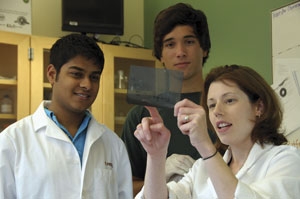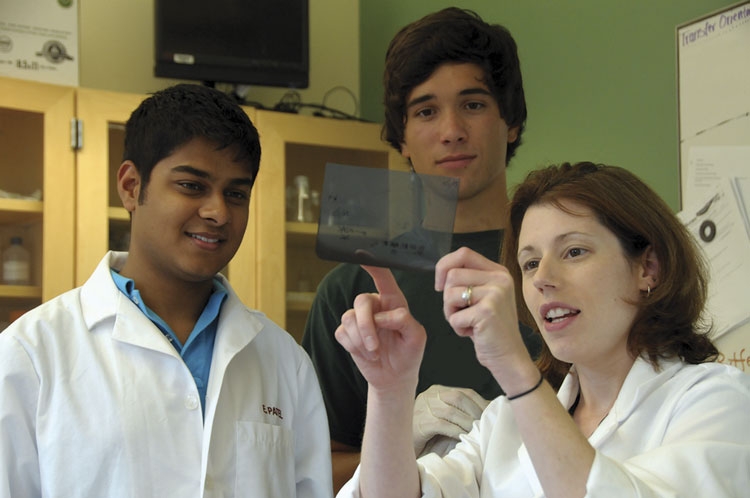Associate Professor of Biology Mindy Reynolds has been recognized as one of the top teachers and mentors in her primary field of research, toxicology. Reynolds, who studies the carcinogenic effects of chronic exposure to heavy metal compounds such as nickel and cadmium, was named winner of the 2015 Undergraduate Educator of the Year Award from the Society of Toxicology (SOT).
In addition, the Society announced Washington College senior Kathryn Fulda as one of 14 winners of its Undergraduate Student Travel Awards. The award will support her travel to San Diego in March for SOT’s 54th Annual Meeting and ToxExpo, where Professor Reynolds will be honored.
SOT is the world’s largest and most prestigious professional association for toxicologists, and its mission includes “creating a safer and healthier world by advancing the science of toxicology.” Calling Reynolds an inspiration to her students, Society president Norbert E. Kaminski said the teaching awards were created to support toxicologists who have “dedicated themselves not only to the profession, but also to mentoring budding scientists in the possibilities of the field.” In addition to honoring Reynolds as the top professor at the undergraduate level, SOT bestowed its 2015 Education Award to Theodore Slotkin, a professor at Duke University Medical Center.
“It is truly a joy not only to teach and get students excited about the field of toxicology but also to have them come to my lab to understand the bench science,” says Reynolds, who lives in Chestertown. “I strongly believe that learning happens both inside and outside the classroom.”
Reynolds has developed a course that introduces students to concepts in toxicology through case studies and historical events. “I try to have the students look beyond what they normally see in a textbook to understand that toxicology affects their everyday lives,” she says.
Her lab research deals with the molecular mechanisms behind the carcinogenic effects of repeated exposure to heavy metals. “Unlike organic waste, metals are not degraded by living organisms and may accumulate up to harmful levels,” she says. “The mechanisms of how that affects health are not well understood, but recent research shows a multifaceted pattern of metal interactions with cellular macromolecules and genetic processes. My research is focused on understanding the molecular mechanisms of cytotoxicity and genotoxicity following coexposure to heavy metals.” She uses human cell cultures and also live zebrafish, which offer tractable genetics and embryology. “We expose adult zebrafish and larvae to various concentrations of heavy metals and then monitor any developmental abnormalities,” she notes.
She takes great satisfaction in introducing students to both the frustrations and the excitement of the laboratory. Working with Reynolds during the academic year and as summer researchers, Washington College students learn lab techniques such as cell culture, protein analysis, Western blot analysis, fluorescence microscopy, and gel electrophoresis.
As a researcher and undergraduate mentor, Dr. Reynolds is a “dynamo,” says one of her colleagues in the biology department, associate professor Martin Connaughton. “She exudes comfort, confidence and charisma, and her rapport with her students in the classroom and in the lab is remarkable.”
Reynolds takes great satisfaction in her student outcomes. “Many students who have worked in my lab have presented their results at the annual SOT meetings and gone on to pursue advanced degrees and obtain research internships at prestigious institutions,” she says. “That is what makes me most proud—to have a student continue on to Ph.D. programs in toxicology.”




Write a Letter to the Editor on this Article
We encourage readers to offer their point of view on this article by submitting the following form. Editing is sometimes necessary and is done at the discretion of the editorial staff.